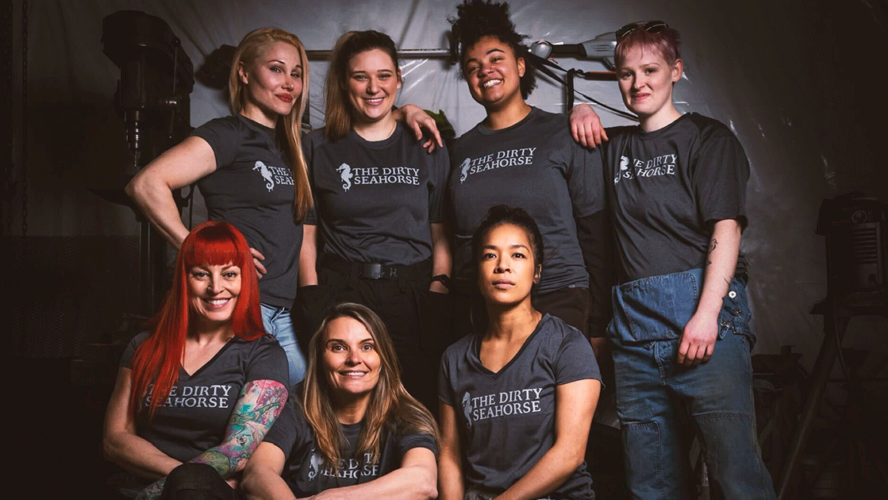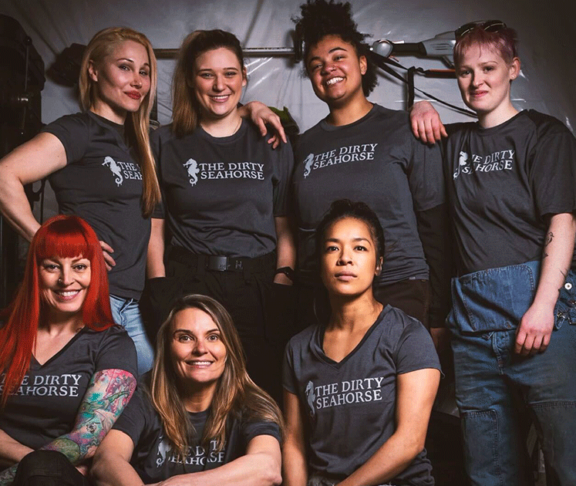
Jamie McMillan
Keynote Speaker, Journeyman Ironworker & Skilled Trades Advocate

What inspired you to dive into the Skilled Trades Industry?
It wasn’t my first career choice, in fact I wasn’t even made aware that skilled trades were a career option until my mid 20s. After high school I went on a convoluted journey, trying to find myself, I made some poor life choices. I knew I needed to find a career but the idea of academia seemed paralyzing. Comparing my life to others became increasingly embarrassing as I got older causing anxiety and depression.
One day while walking to a nearby grocery store, a chance meeting with a former classmate sparked a conversation about her career path. She had completed an “earn while you learn” apprenticeship and become a fully certified skilled trades professional at no cost to her. I immediately began to do my research. I became hyper focused on the idea of paid training and applied for an apprenticeship to become and ironworker. To my delight I received a letter not long after addressed to Mr. Jamie McMillan approving my apprenticeship beginning my journey as an apprentice to become an ironworker in 2002. After 20+ years I can proudly say with confidence, skilled trades saved my life and open doors to opportunities I never dreamed of. I am now a proud member of the Local 97 Ironworkers.

What was your experience like as a woman in trades?
Despite various obstacles women in trades have unique advantages and opportunities in building and construction careers. Personally I have found it to be an engaging, rewarding career. I have dealt with my fair share of challenges and difficult personalities but over the years have become increasingly resilient. Rather than allowing negativity to discourage me, I decided long ago that changing some of the bad behaviours in the workplace is a work in progress however in the meantime I can change the way I think about it. By shifting my mindset, I have been able to stop taking things personally, smile in the face of adversity, and prove myself. By using negative energy as my motivational drive to succeed I have turned some of the most difficult naysayers into my biggest supporters. It has made me a stronger, better person in the workplace and my personal life.

What are some of the best benefits of working in the skilled trades?
There is likely not enough room for me to list the benefits but here are a few…
Skilled Trades are essential, as long as human life exists on this planet we need people to build and maintain the infrastructure all around us. From the deepest mine to the furthest space station, there is no end to the career possibilities and opportunities for advancement, not just locally but globally.
Whether you start your journey through a technical institute or choose an “earn while you learn” apprentice the trades equip you with practical knowledge and transferable skills that can be used in so many aspects of life. The wages are excellent, building infrastructure is empowering and the satisfaction of having something to show for your hard work gives skilled trades professionals bragging rights. We literally build and maintain the structures that decorate our landscape. We drive around with friends and family just to proudly say, “See that structure or bridge or building that employees 1000s of people? Yeah man, I helped build it!” It’s an unbeatable feeling to know that skilled workers are the backbone of physical infrastructure all around the world and we get to celebrate being a small part of it.

Were there any misconceptions you had about diving into this field that you found to be untrue?
I was a little naïve about some things in the very beginning but realized quickly that was some of the misconceptions about the labor workforce were inaccurate. Growing up construction was discourage while academia was encouraged. The biggest misconception was that it was a dirty, backbreaking job for those who struggled in school or dropped out. The truth is construction careers are represented by some of the most creative, intelligent, hard working individuals I’ve ever met. Regardless of how we identify, we are crafty, mechanical minded individuals that prefer to work with our hands rather than occupying a office desk. As many ironworkers and other skilled workers say, we don’t go to the office, we build it!!

What advice do you have for those looking to start a career in the trades?
DO IT! If you’re looking for a fun, challenging, yet rewarding career, skilled trades is an excellent pathway with excellent wages, be if it’s, retirement packages and endless opportunities for advancement. However, if you plan to enter the labor workforce please be part of the positive change we need to see in the industry. Recognize that we still have challenges and barriers in our quest to become an industry that is 100% diverse, equitable and inclusive but you can be part of the change. Have a good attitude, represent the industry with dignity and respect, develop healthy boundaries and leave your hard feelings at the gate. Teamwork is important, even when your stuck with antagonistic coworkers. Don’t tolerate bad behaviour and never be ashamed to stand up for yourself or coworkers who may be having a difficult time. Take every opportunity to advance into leadership roles and never forget where you came from.
Side note 1: Recruitment is easy, retention is difficult. It’s very important for those in skilled trades to pay it forward by becoming a positive voice to the next generation of skilled workers. We can shift the mindset of youth, parents and educators with workshops, hands on activities, cooperative education and apprenticeship programs but we need to focus on other important a aspects as well. We need to focus on providing students with realistic job previews, soft skills, education about health, safety and the importance of having a good attitude but we often overlook the importance of psychological safety. We need to equip future recruits with the skills and ability to overcome adversity, work with difficult personality styles, maintain healthy boundaries and represent the industry with integrity and respect.
Side note 2: Naturally as an underrepresented group there are a number of unique challenges and barriers for women in male dominated industries. It is important to remember that this is not a construction issue, it’s a human issue that is present in all aspects of life and workplace environments.
Get made in the trades. Learn more by visiting madeinthetrade.com.


